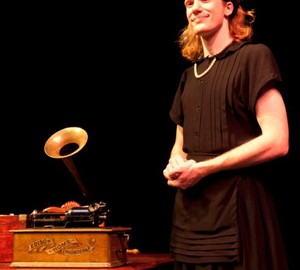Four KSC students—history majors Kyle O’Brien and Alexander Habibi, theatre and dance major Matt McDougal, and music major Jordan Chase—will be presenting at the National Conference on Undergraduate Research (NCUR) at the University of Kentucky from April 3–5.
Sending four students to the conference is a real accomplishment for the students and the college, according to Dean of Arts & Humanities Andrew Harris. NCUR is the largest undergraduate research conference in North America, featuring over 2,000 student presentations and reflecting all disciplines in higher education. “It is the kind of conference that we ought to seek out for more of our students, as it offers them a wonderful opportunity to present their work in front of students from colleges and universities all over the country. Student presentation there speaks not only to the quality of student research required for acceptance, but also to the institutional culture that supports a high level of student scholarship and faculty mentoring,” Dr. Harris explained. Keene State is the only institution in New Hampshire that is sending students this year.
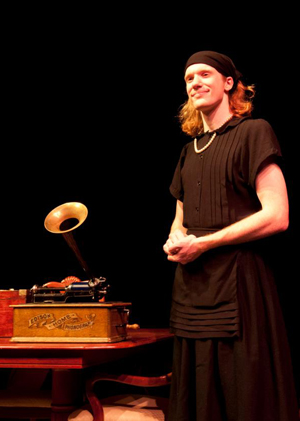
Matt McDougal will be presenting about his work performing 35 different roles in the production of the one-man Pulitzer Prize winning play I Am My Own Wife, written by Doug Wright and directed here at Keene State by Timothy L’Ecuyer. “This play tells the true story of Charlotte von Mahlsdorf, a German transvestite who lived openly in East Berlin through both the Nazi and Communist regimes,” McDougal said. “Like the playwright during the creation of the play, it was my job as the actor to research the given circumstances of the story in order to create a more informed and authentic theatrical production. This included research of the characters spanning a wide range of ages and nationalities, settings across two continents, and backgrounds behind two of the most complex historical eras of the millennium: Nazi and Communist Germany. This is all presented within the social and political contexts of queer culture. Additionally, linguistic research was necessary to portray the diverse characters represented throughout the play. Through slides, lecture, and performance examples, the application of this research will be demonstrated to conference audience members.”
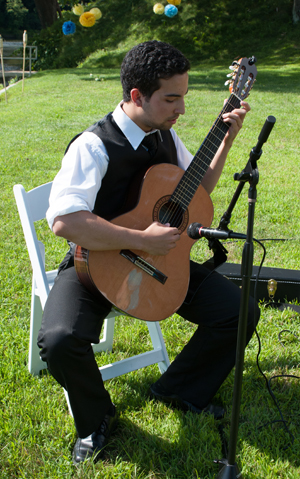
Jordan Chase’s project, “Orchestration of a Large-Scale Music Composition,” is a reflection of the project he completed over the summer under a Summer Undergraduate Research Fellowship (SURF) grant. “Receiving the SURF grant gave me the opportunity to learn about the orchestral instruments and apply the knowledge I learned to my compositional studies,” Chase said. “The study of instrumentation, orchestration, and formal structure in music enhanced my understanding of music theory at its core and of the compositional process as a whole. At the NCUR conference I plan to explain the musical concepts I learned and how I applied them to my composition, Foreign Comfort. Throughout the presentation I will play excerpts of my piece, demonstrating specific references and ideas to the audience. I am hoping to conclude with a full playback of one of the movements and a brief question-and-answer session. I definitely believe this opportunity will enhance my future, because I’ll gain valuable assets and skills along with a great deal of responsibility and self-confidence.”
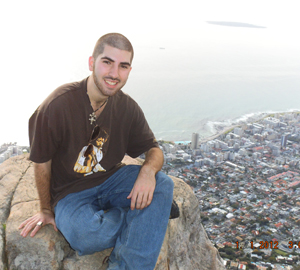
Alexander Habibi’s research project focuses on the philosophy of the South African anti-apartheid activist Steven Biko, who is credited with founding the Black Consciousness movement that sought to unite and instill pride in oppressed black South Africans during the apartheid era. Biko was detained at a roadblock, tortured, and murdered by security police. “I chose the topic because I studied abroad in Cape Town last spring semester and was fascinated by the struggle South Africans waged against an oppressive, minority-ruled state,” Habibi explained. “While Biko’s ideas were popular among the black South African youth during the radical 1970s, many South Africans my age that I met were either apolitical or so concerned with daily survival that radical politics didn’t seem practical in post-apartheid South Africa. … Although my project is a bit abstract and intellectual, I think it’s a task that involves knowing enough about philosophy to understand how an actual person absorbed ideas and put them into effect. … I owe my acceptance to my advisor, Dr. Nicholas Germana, who not only revised all four drafts of my abstract, but helped me understand many of the complicated philosophical aspects I’d be dealing with.”
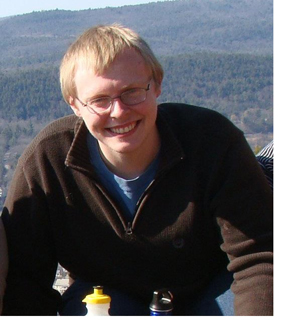
Kyle O’Brien will be presenting a paper, “Lifting the Veil,” on early German Romanticism, a literary movement in the late 18th century. The paper’s title refers to the poet-philosopher Novalis’ (Friedrich Von Hardenberg’s) ideas about the poet and his place in society. “I focus on the concept that it is the poet who can lift the veil of truth and that the poet becomes worthy to do so through a ‘circuitous journey’ in which he leaves and returns home with knowledge of the Truth, creating a return to a golden age,” O’Brien said. “My paper will incorporate romantic notions about sexuality, epistemology, and semiotics. I focused on this topic because I’m interested in the history of philosophy generally, but I’m also interested in the nature of language and what relationship it has to reality. These early Romantics saw the world through a mytho-poetic lens that they themselves self-consciously created. Mythology and poetry are things which I think are part of and integral to the human condition; things that the contemporary world has lost sight of.”
